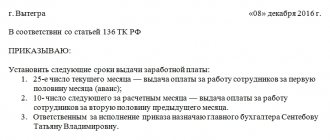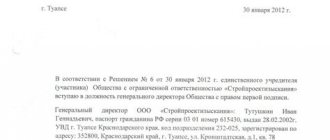Article 136 of the Labor Code of the Russian Federation. Procedure, place and terms of payment of wages (current version)
1. The provisions of the article are formulated in relation to the rules provided for by ILO Convention No. 95 “Concerning the Protection of Wages” (1949).
2. When calculating and paying wages, each employee must be given a pay slip containing information about the amount and components of wages, as well as about deductions made. The list of information established by Part 1 of the commented article is required for inclusion in the pay slip.
The form of the payslip is not specified by the Code; it is approved by the employer, taking into account the opinion of the representative body of employees. Thus, it is given the force of a local regulatory act, which serves as an additional guarantee of workers’ rights.
The pay slip must be issued at least once a month when the final payment is made based on the results of the month’s work.
The value of the payslip is very large. Judicial practice is based on the fact that only if the employer issues a pay slip for wages, it is permissible to assume that the employee should have known about the violation of his rights in connection with incomplete payment. When considering a specific case, the court found that the form of pay slips for calculating wages was not approved by the employer, and pay slips were not issued to employees. Thus, the employer did not fulfill the obligation to issue wage slips. Therefore, the court had no reason to assert that the employee could and should have learned about the components of his salary every month when receiving wages. During the consideration of the case, it was established that the plaintiff became aware of the violation of his right to full payment only in September 2012 (in connection with the consideration of claims of other workers, when it was reliably established that the workers’ wages were calculated by the defendant without taking into account the Ural coefficient). As a result, the reasons for the employee missing the deadline to go to court were recognized as valid (Determination of the Sverdlovsk Regional Court dated February 22, 2013 in case No. 33-1620/2013).
3. Wages must be paid at the place where the work is performed. This rule was established in order to create the most convenient conditions for the employee: he should not waste his free time and travel in order to receive wages at the central office of the organization, centralized accounting, etc.
The place where work is performed (including a specific workplace remote from the location of the organization) is determined by the internal labor regulations, other local regulations or an employment contract.
4. A collective agreement or employment contract with a specific employee may provide for the transfer of wages to a bank account specified by the employee. A corresponding change can be made to the employment contract after its conclusion.
The terms of the transfer (terms, procedure, amounts) are determined in the collective agreement or in the employment contract. The costs of transferring funds and servicing a bank card (if an appropriate account is opened) are borne by the employer.
5. When paying part of the salary in non-monetary form, the place, terms and procedure for issuing the relevant goods (products) are established in a collective or labor agreement. In this case, the most favorable conditions for the employee must be provided, for example, bulky or heavy goods must be delivered to the employee’s home or he or she must be given the opportunity to remove them step by step.
For payment of wages in non-monetary form, see also the commentary. to Art. 131.
6. Salaries are paid directly to the employee. Exceptions to this rule may be established by federal law or employment contract. Federal laws currently do not establish such exceptions. In an employment contract, the parties are free to establish any method of payment of wages, for example: transferring it to the account of the employee’s spouse (one of the parents, children, etc.); issuance of wages in cash under a power of attorney issued by the employee.
In case of limitation of the employee’s legal capacity in the manner provided for in Art. 30 of the Civil Code of the Russian Federation, his salary is issued to the trustee on the basis of a trustee certificate or to the employee himself, but on the basis of the written consent of the trustee.
7. Salaries must be paid at least every half month. Specific days for the payment of wages are established by a collective agreement, or internal labor regulations, or an employment contract.
In practice, two or three days for the payment of wages are usually set, for example, 1 - 3rd and 15 - 17th of each month. Most organizations use an advance payroll system, in which an advance payment is paid in the middle of the month, which is usually part of the tariff rate (official salary) and compensatory additional payments of a permanent nature (for harmful working conditions, etc.), and at the beginning of the next month final payment including incentive payments.
Salaries are issued on the basis of statements. Resolution of the State Statistics Committee of Russia dated 01/05/2004 N 1 approved unified forms of primary accounting documentation for recording labor and its payment, including the forms of payroll, payroll, payroll, payroll register (from 01/01/2013 are not mandatory).
8. The establishment of other terms for payment of wages is possible only in federal law. An agreement to pay wages once a month, regardless of the level at which it is concluded, is contrary to legal requirements.
9. The commented article provides for special rules for the payment of wages in cases where the day of its issuance coincides with a weekend or non-working holiday. In these cases, wages must be paid the day before - on the last day of work or in advance.
Vacation is also paid in advance. In case of violation of the deadline for payment of vacation, it can be postponed (see commentary to Article 124).
10. Parts 3 and 5 of the commented article were the subject of challenge in the Constitutional Court of the Russian Federation, which in the Determination of April 21, 2005 N 143-O indicated that these norms represent guarantees for the implementation of the enshrined Labor Code (Articles 2, 21, 22 and 56 ) the employee’s rights to timely and full payment of wages; are aimed at ensuring coordination of the interests of the parties to the employment contract when determining the rules for payment of wages, at creating conditions for the unhindered receipt of wages personally by the employee in a manner convenient for him and comply with the provisions of ILO Convention No. 95 (1949).
Comment source:
Rep. ed. Yu.P. Orlovsky “COMMENTARY ON THE LABOR CODE OF THE RUSSIAN FEDERATION”, 6th edition ACTUALIZATION
ORLOVSKY Y.P., CHIKANOVA L.A., NURTDINOVA A.F., KORSHUNOVA T.YU., SEREGINA L.V., GAVRILINA A.K., BOCHARNIKOVA M.A., VINOGRADOVA Z.D., 2014
Salary payment procedure
Payroll is one story. It is much more important to check the accuracy of the payment being made.
Issue date
As stated earlier, salaries are paid to employees twice a month and on certain set days. The intermediate period is no more than 15 days (Article 136 of the Labor Code of the Russian Federation). A delay in payment in accordance with Article 236 of the Labor Code of the Russian Federation entails additional charges in the form of compensation and an amount of 1/150 of the key rate of the Central Bank of Russia.
Pay slip
Each employee must be familiar with the procedure for setting up wages. To do this, he is given a pay slip, which includes the following information:
- personal data of the worker - full name, position, account of the recipient, if the money is transferred to a bank card;
- the tariff rate specified in the employment contract, which is included in the calculation;
- hours of actual work or volume of products produced;
- payroll – salary;
- additional amounts that act as a salary supplement;
- contributions to the Tax Service - personal income tax;
- other monetary minuses indicating the reason or name of the payment.
It is important to know! The last paragraph includes such deductions as payments for alimony, for a loan or loan previously issued by the enterprise, and replenishment of material damage. At the end, the document contains the amount intended for final transfer to the employee’s account.
Commentary on Article 362 of the Labor Code of the Russian Federation
Managers and other officials guilty of violating labor laws bear responsibility in cases and in the manner established by the Code and other federal laws.
In particular, evasion of participation in negotiations on concluding, amending or supplementing a collective agreement (agreement) or violating the established deadline for negotiations, as well as failure to ensure the work of the commission for concluding a collective agreement or agreement within the time frame specified by the parties - entails the imposition of an administrative fine in the amount from ten to thirty minimum wages (Article 5.28 of the Code of Administrative Offenses of the Russian Federation).
Failure by an employer or a person representing him to provide, within the period established by law, the information necessary for conducting collective negotiations and monitoring compliance with a collective agreement, agreement - shall entail the imposition of an administrative fine in the amount of ten to thirty times the minimum wage (Article 5.29 Code of Administrative Offenses of the Russian Federation).
For an unjustified refusal by an employer or a person representing him to conclude a collective agreement, an agreement - entails the imposition of an administrative fine in the amount of thirty to fifty times the minimum wage (Article 5.30 of the Code of Administrative Offenses of the Russian Federation).
Violation or failure by an employer or a person representing him to fulfill obligations under a collective agreement (agreement) shall entail the imposition of an administrative fine in the amount of thirty to fifty times the minimum wage (Article 5.31 of the Code of Administrative Offenses of the Russian Federation).
For the employer or his representative to avoid receiving the demands of employees and to participate in conciliation procedures, including failure to provide premises for holding a meeting (conference) of employees in order to put forward demands or creating obstacles to the holding of such a meeting (such a conference), shall entail the imposition of an administrative fine in the amount from ten to thirty minimum wages (Article 5.32 of the Code of Administrative Offenses of the Russian Federation).
Failure by the employer or his representative to fulfill obligations under an agreement reached as a result of the conciliation procedure entails the imposition of an administrative fine in the amount of twenty to forty times the minimum wage (Article 5.33 of the Code of Administrative Offenses of the Russian Federation).
Dismissal of workers in connection with a collective labor dispute and a strike is subject to an administrative fine in the amount of forty to fifty times the minimum wage (Article 5.34 of the Code of Administrative Offenses of the Russian Federation).
Forms of remuneration
According to the provisions of Art. 135 of the Labor Code, wages to employees are calculated on the terms of the employment contract concluded with them, taking into account the current remuneration system. Each employer develops its own remuneration system for its employees, focusing on its preferences and economic working conditions. At the same time, the adopted remuneration system cannot contradict the provisions of the Labor Code. Such provisions are automatically invalid and cannot be applied in practice.
There are two key types of forms of remuneration: time-based and piece-rate. The time-based form is used in enterprises when it is impossible to normalize production or there is no need for it. In this case, it makes more sense to pay employees for the time they work, rather than for the amount of work they do.
In this way, salaries are most often calculated for administrative personnel, lawyers and marketers, secretaries, etc.
The time period that underlies the calculations can be a day, a month (the most common type of payment is monthly salary) or another option. If an employee works part-time, then his salary is accrued only for the period worked.
Also, organizations often practice the use of a time-based bonus form , when a bonus for quality work done is added to the basic salary on a time-based basis. Bonuses can be paid on a regular basis or in a lump sum.
The piecework form of payment is usually applied to employees of production departments or specialists involved in the service sector. It is more profitable for the employer to pay them not for the time worked, but for the amount of work completed. For each unit of product produced or volume of services provided, the employee is charged a certain amount (also called the piece rate).
It turns out that the higher the productivity, the higher the salary the employee will receive. Therefore, this form of payment acts as an incentive to increase productivity for employees.
In small start-up organizations, a non-tariff form of payment may be used , in which employee earnings may depend on the financial performance of the company. In practice, tariff and non-tariff forms of salary calculation can be combined: for example, when an employee regularly receives a certain salary, and the other part of the amount (bonuses) is accrued to him based on sales results or the company’s financial results for the quarter.







